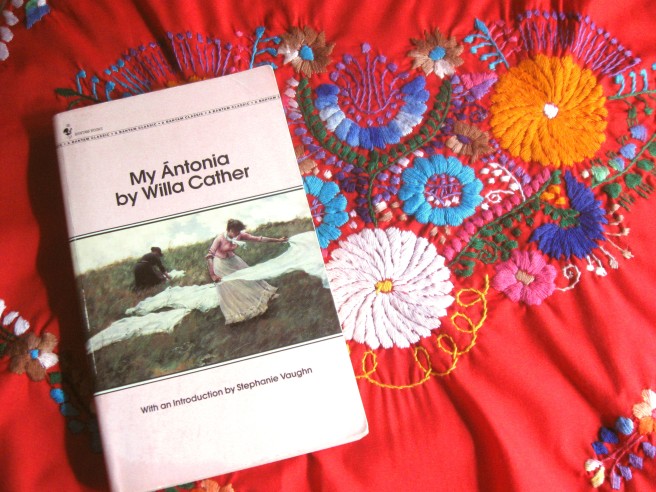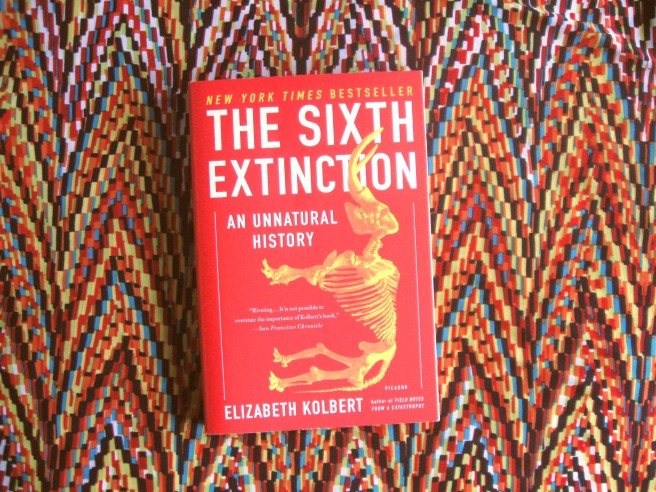
#98 – My Ántonia, by Willa Cather
- Read: 7/5/18 – 7/8/18
- Challenge: Mount TBR (90/150); Expand Your Horizons — Classics
- Rating: 5/5 stars
The blurb on the back cover gave me a vastly different idea of the focus of the book than was actually the truth–part of me kept waiting for the time in the story named, when Antonia returned to Black Hawk and disrupted life there with her “lush sensuality.”
I’m not entirely sure the person responsible for that blurb has actually read the book, because that never happened. Ántonia’s elopement and return didn’t happen until page 250ish of a book of almost three hundred pages.
So in that respect, I was disappointed. I didn’t know anything about the book beforehand, so the blurb was all I had to go by.
Yet, I think I like this better than I would have if I’d gotten the story I expected.
It’s a story about love, and somehow it’s still not a love story. When Jim tells one of Antonia’s children, at the end, that he once loved their mother very much, it’s romantic and wistful, an expression of gentle regret that Ántonia had not been a larger part of his life as an adult. But he remembers fondly all the times they had together growing up, how in some ways she <i>was</i> his childhood.
And it’s beautiful. It’s beautiful how honest their friendship is, even when it’s complicated, even when they don’t see each other for years. In fact, this novel might be the best depiction of friendship between a boy and a girl that I’ve ever seen. Especially as we know right from the start that Jim doesn’t marry Ántonia, or Lena, or any of the other girls from Black Hawk, we can follow his narration of life viewing it as a long string of might-have-beens (it did seem for a while like he would have married Lena, if she would have had him) and a far-traveling circle leading him back to the many types of love that sustained him as he grew up.
Outcasts and orphans have a place, there on the prairie, where hard work and a little luck can carry someone far.
I can’t do the descriptions of Nebraska justice. The countryside is held up as the epitome of a place to live, with cities being shabby, impersonal, ill-omened. Modern city-dwellers might not agree, but the lyrical beauty of Cather’s prairie paradise transports you there, among the crickets and rivers and waving grasses, under the broiling sun.
This story also embodies the dual pioneer and immigrant spirit of the West, and indeed of America itself at the time. There’s racism against blacks (of course, product of the time it was written) but compared to other works of its era that I’ve read, it was downright mild; and there was only a touch of prejudice here and there, not so much between “Americans” and the various immigrant groups that populate the cast, but between the groups themselves, holdovers of the “old country.” While this isn’t a utopian ideal in any sense, it embraces what America should be, and given the current political climate, reading this was simultaneously nostalgic and a breath of fresh air. Which, granted, is a weird juxtaposition, but I’ve just gotten so tired of “classics” that are nothing but racism and misogyny from start to finish.
Apparently I should be reading more “classics” written by women. And also, more Willa Cather, because I loved this.

#99 – The Sixth Extinction: An Unnatural History, by Elizabeth Kolbert
- Read: 7/8/18 – 7/12/18
- Challenge: PopSugar Reading Challenge; Expand Your Horizons — Nonfiction
- Task: A book that was being read by a stranger in a public place
- Rating: 5/5 stars
I come out of this saddened, shaken, and perhaps not as hopeful as the last chapter wanted me to be–but still impressed.
Kolbert has taken a tale of Earth’s biohistory spanning billions of years and married it, structurally speaking, to a sort of travelogue of the years of her life spent researching it. We are treated to glimpses of the unusual and sometimes dangerous conditions scientists submit to in order to gain knowledge, as well as the importance of what they find.
When I was in college, thinking I might want to go into ecology, I never imagined it might entail traversing the passages of an abandoned mine, in the dark, where an uncareful step might mean falling to my death down an open shaft, for the purpose of censusing bats.
So the personal anecdotes balanced the heavier, and arguably more important, aspects of the book: that human interference is the likeliest culprit behind many of the current wave of extinctions, and that despite some truly heroic conservation efforts on the species level, the overall problem still remains–human-driven climate change may doom much of the planet, and possibly ourselves as well.
Kolbert herself never states a prediction outright, either that we’re too late to save Earth from irreparable harm, or that reversal is still possible, though with a heavy toll already taken. And that prevents this from being a guilt-trip read, where I walked away feeling responsibility for our predicament. I was reminded of articles I’ve read in the past decrying how environmental-issues marketing in my era was almost solely directed at children; we were taught, growing up, about “reduce, reuse, recycle” and inundated with alarming facts about animal extinction, as if we were the problem, the little kids of the American lower middle class, not the large corporations lobbying against laws preventing them from dumping toxins into the water and carbon into the air.
It taught me to do my part in keeping the world clean and healthy, but not that there were larger forces at work, and certainly not how to fight them.
I appreciate that while the message and tone of the book are certainly dire, I’m left at the end to draw my own conclusion about what to do with this information. I know that my carbon footprint is smaller than those of many other Americans my age–I walk to work every day, I don’t have kids to support, I don’t have pets, I keep my electricity usage as low as possible, I buy whatever I reasonably can second-hand, I recycle, and so on. However, I also know that simply by being born where I was and living even the “simpler” lifestyle that I do, I am still more of a polluter than most of the rest of the world.
Kolbert does specifically mention donation to various conversation efforts, and while it’s not a specific call to action, it’s an obvious suggestion. The call to action my own reaction to the book has created is to involve myself more in politics. I already vote regularly in major elections, but over the past few years I’ve started voted in off-years and primaries as well; the candidates I support have not been climate-change deniers. What I have not been doing is calling my congresspeople to let them know how important legislation about environmental regulation and conservation is to me.
It’s almost strange to me how a tale of extinctions spanning billions of years can inspire a reaction so deeply personal, because I can’t truly step back from this book and judge it objectively. Even if I had issues with the writing style or narrative quirks, does that even matter compared to the weight of what I learned from it? Can I even be a separate and outside observer with my background and education in the sciences? I’m not sure that I can, when I remembered myself out there in the forest censusing wildflowers for my ecology lab, or writing a term paper on the diminishing biodiversity in the Colorado River, or listening to a lecture on zebra mussel invasion into the Great Lakes. The sixth extinction may range worldwide over centuries, but I can’t grapple with something that big, so perhaps I have to make it personal, viewed through the lens of my learning experiences, in order to feel like I can do something about it. If I can’t make it personal, then the scale is so large that it’s tempting to give up hope.